
Last week, Portland City Council moved forward on a work plan to address the climate crisis outlining the “actions Portland can and must take to eliminate carbon emissions by 2050.” This plan emerged from City Council’s 2020 Climate Emergency Declaration, which set new, ambitious emissions reductions targets and reentered Portland’s climate plan to focus on climate justice and equity.
But transportation advocates have largely stayed focused on their own work instead of commenting on this work plan at all, and those who have spoken up aren’t impressed by the vague language in the plan and the lack of dedicated funding for many of the action items in the plan. Adding to the unease are recent pro-freeway expansion Council votes which don’t give the City of Portland much credibility when it comes to climate action.
The Bureau of Planning and Sustainability (BPS), headed by Commissioner Carmen Rubio, led the construction of this work plan, but it’s broken up into multiple categories which involve other City bureaus, especially the Portland Bureau of Transportation (PBOT).
There are nine actions outlined in the work plan’s transportation category. They are as follows:
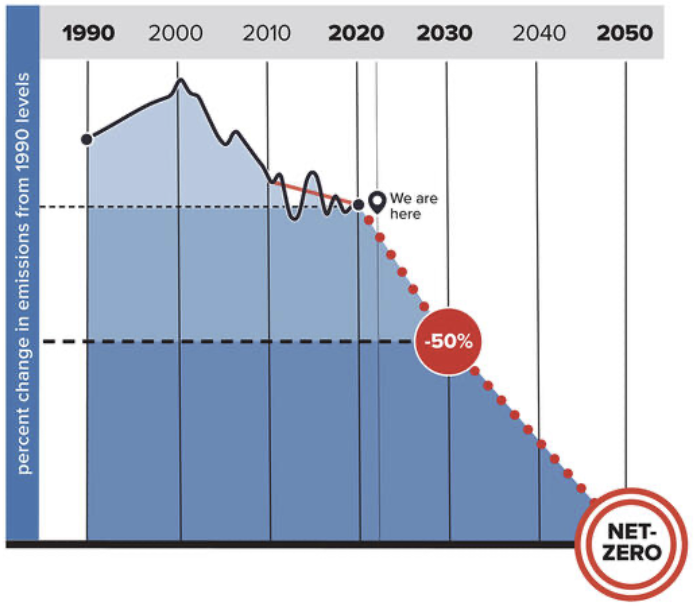
- Make low-carbon travel options safe, accessible, and convenient for all Portlanders.
- Use equitably designed pricing strategies and parking management to encourage less driving when people and businesses have other travel options.
- Decouple transportation funding from fossil fuels.
- Make low-carbon transportation options more affordable, especially for those who can least afford them.
- Support state and regional vehicle miles traveled reduction policies.
- Make new construction ready for electric vehicle charging.
- Make it easier to use electric vehicles if you can’t charge at home.
- Make freight cleaner.
- Replace petroleum diesel at the pump.
The document explains how the city intends to follow through on these actions, with some explanations more detailed than others.
Many action items are vaguely worded and/or have no dedicated funding.
The description for accomplishing the first item is a good example of this. Here, the document says this action item will be accomplished via “allocation of space on city streets for non-single occupant auto trips, increase funding for infrastructure projects, activation and programs that support more people making more trips by walking, biking and transit.”
Other actions are more straightforward: for example, Portland has a plan in the books to price driving and parking in order to reduce car dependency, which gives a bit more weight to the second action item.
“Clapping each other on the back for saying you’ll do something about [the climate crisis] only adds insult to injury.”
– Liam Castles, in city council testimony
The 2020 Climate Emergency Declaration came right after Mayor Ted Wheeler and then-Portland Bureau of Transportation Commissioner Chloe Eudaly revoked their support for the I-5 Rose Quarter expansion project, which added some legitimacy to their climate action ambitions. Now things are different. Not only did the City recently rejoin the Rose Quarter project, they also unanimously voted to support the Interstate Bridge Replacement Program’s (IBRP) Locally Preferred Alternative just a week before adopting the climate work plan. The IBRP will expand I-5 over the Columbia River and advocates don’t think it will provide the active transportation infrastructure necessary to offset the increased car capacity.
At the July 20th City Council meeting when Council heard public comment about the climate work plan, youth climate activist Liam Castles criticized the commissioners for what he sees as their performative support for climate action that doesn’t have any weight behind it.
“You are voting on my future and the future of every young person in Portland,” Castles said. “Clapping each other on the back for saying you’ll do something about [the climate crisis] only adds insult to injury.”
Wheeler responded to Castles by encouraging him to run for City Council in the future.
The commissioners did agree with critics that even the best-laid plans aren’t meaningful if they aren’t followed by action.
“We have a lot of work ahead, and it will take real substantive action from all of us to make the consequential changes that we did for Portland, for our families and for future generations,” Rubio said.
Current PBOT Commissioner Jo Ann Hardesty acknowledged critics by thanking climate activist organizations the Sunrise Movement, Verde and The Street Trust for being good partners “no matter how frustrated they get with us at times.”
While commissioners all agreed to move forward with this plan, they’ll still accept written input until August 24th, when they’ll reconvene on the subject. Commissioners emphasized the ongoing nature of this work and said the plan will continue to evolve as more stakeholders weigh in.
The Pacific Northwest is currently in the midst of a brutal heat wave that has already been linked to the deaths of four Oregonians. Like the work plan says, it’s now or never. The question is whether or not these strong words will be followed up with action, which will require dedicated funding and considerable work on the part of City Council.
Read the full work plan here.



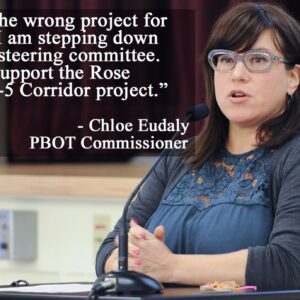
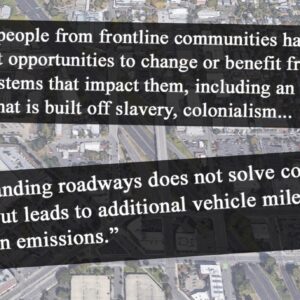
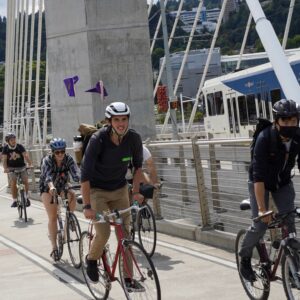
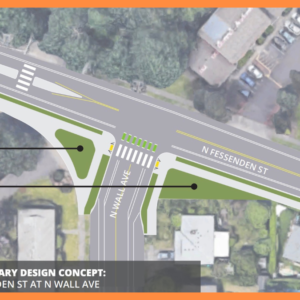
Thanks for reading.
BikePortland has served this community with independent community journalism since 2005. We rely on subscriptions from readers like you to survive. Your financial support is vital in keeping this valuable resource alive and well.
Please subscribe today to strengthen and expand our work.
2022 is almost over and this so-called plan dares to argue that these milquetoast and mostly-unfunded interventions will lead to a 50% drop in production-based emissions in 7 years? The neoliberal hopium in this city is sickening.
PS: A large fraction of the drop in total CO2e emissions on the cited chart were due to the loss of industry in Portland. Exporting our consumption elsewhere is green-washing.
Also notice who their ideas about equity leave out.
Let’s just admit this battle was lost.
Ok, you have said this before,, then What?
Seems like a reasonable stupid position to hold… Species are going extinct, who cares, live with it….Cancer seemed incurable, deal with it..
What an attitude to go through life with.
thank you for saying that, dwk. We didn’t used to agree on much but more so lately.
The Battle for Portland, maybe (but then you should be used to that).
The war is far from lost. I see plenty of reasons for optimism, including the fact that the economics of transition seems to be favorable, meaning we’ll be able to do a lot (and are doing a lot) without resort to coercion or bribery. I have no reason to think that won’t continue and accelerate.
And now there’s signs at the federal level that we’re going to start the bribery.
What Portland does is largely insignificant, so let’s not worry too much about it.
Losing a battle does not mean losing the war – I hope
This is beyond pathetic. This is an abdication of any responsible action. Where are the fines for the biggest GHG producers? Where are the car-free areas and heavy truck diesel penalties? Where are the no-idling mandates?
The City Council continues to fail in new and mysterious, yet predictable, ways.
The rest of it is impractical or undesirable for a number of reasons that should be obvious given a minute’s thought, but we do have a no-idling mandate… though enforcement is so gouache these days.
Car-free areas are desirable for a number of reasons that should be obvious given a minute’s thought.
Possibly quite desirable, but impractical in a city like Portland (unless your car free “areas” extend about a block on low traffic streets and still allow cars). And certainly not a climate mitigation.
That said I’d love to hear ideas for a designated car free area bigger than the single block things we’ve been trying that would be popular among stakeholders (i.e. residents and businesses), would enhance the local area (unlike the Transit Mall, which sucked) and would, ideally (apropos to the topic of this story), act as some sort of climate mitigation measure.
They may be desirable, but where?
The ginza example throughout Japan, and Third Street in Santa Monica are good examples of how this can be done. SF is thinking about remaking part of Market Street as car-free. There are plenty of other examples.
Japan* is a very different context than the US, for a number of reasons. What works there won’t necessarily work here.
Where would you establish such a zone in Portland? The best I can think of is if we were to rebuild the Lloyd district or Gateway, and we can start from (almost) scratch (similar to what Munich did when it redeveloped its old airport for housing). Retrofitting a car-free zone on a car-oriented city would be difficult. Doing so at any meaningful scale would be nearly impossible.
*Note: I love Japan and the Japanese people. I lived there and have traveled extensively throughout the country on several trips prior and subsequent, and have a number of Japanese friends.
And Americans love their bureaucracies. Why do something efficiently when you can make it redundant & endlessly torturous?
American bureaucracy is nothing — visit India or China and see what real bureaucracy looks like.
We’re Little League tykes to their Major League pros.
Actually penalties and tolls on diesel operators, especially heavy trucks is very practical and would not only cut down of GHGs but other PM as well. Car free areas are historically abundant in cities all over the world, and practical. And the fines on GHG producers are constantly reduced with each new missive from the city govt.
As long as the City Commissioners slap each other on the back while ignoring the reality of the climate crisis that is unfolding, and extrapolating, around the planet, they might as well do absolutely nothing. At least that would be more honest. So slap away and give in to the polluters once again.
Penalizing diesel trucks would either make anything shipped by truck much more expensive or cause shippers to switch to gasoline, which emits more CO2 per mile. Perhaps both.
To be clear, I am not defending the woeful performance of the City (or the woeful performance to date of its PCEF program); I just think the particular examples you picked are bad. We as a region can do more: Metro should
forceencourage garbage haulers to go electric, and the city should start switching its fleet (or switch it faster) and require contractors to use electric machinery. And TriMet should, of course, switch to electric buses. That they still buy diesel buses is a joke.You are wrong. London is doing this quite successfully. And while inflation is an issue in England as it here, Big Ben remains standing still and diesel fumes are way down. Electric trucks are already being planned by US auto manufacturers. Making diesel cost prohibitive is a plus anyway you look at it. As far as passing along costs, it seems you may not be able to visualize the catastrophic damages from climate change just around the corner.
Deep down, there is part of me that does agree with your fatalism. Yes, it may be too late, so why bother doing anything. I do see the appeal of that intransigence. Kind of an inspired collapse, I suppose.
I am wrong; I should have mentioned electric as an option for trucks to switch to, not just gasoline. But some things are possible for a large European capital to do that a middle-tier American city can’t. London can dictate terms because it has far more leverage than Portland does. And London hasn’t yet done it, so we don’t know how it will work.
I am a firm believer in electric trucks, but equally firm in my belief that it isn’t something Portland can do without statewide action, and would probably require California to join us (or, more likely, lead the way). Given the complexity of the legal landscape, it would probably require federal action as well.
I believe that before all those moving parts can come together, trucking firms will convert on their own for economic reasons, possibly coupled with automation.
Also, as noted elsewhere, I am hardly fatalistic. I’m probably the most climate-optimistic person in these forums (except, possibly, the deniers).
More info on Paris, with some references to London:
https://www.thegrocer.co.uk/supply-chain/can-cities-still-feed-themselves-once-diesel-trucks-are-banned/665717.article
Hmm. This is starting to illuminate your prolific resistance to pressure for change for me. After all, why spend the energy if things’ll just sort themselves out?
I wish I shared that optimism.
I’m all for pressuring change (for example I fully support mandates phasing out gasoline car sales, and only wish they were more aggressive).
But I’m also not about flagellating leaders for not taking actions that are pointless or just wouldn’t work. That just makes it harder for them to support things that would.
So while I support a rapid national or even West Coast phase out of gasoline autos, I do not support Portland trying to take action on that because it will consume loads of political capital and achieve nothing.
There’s plenty to do. I want Portland to build out an electric charger infrastructure, for example, or start figuring out where all those people living in apartments with no parking are going to charge their vehicles, or ban natural gas hookups in new construction, or convert its own fleet to electric, or figure out how to plant more than a third of the trees we planted last year, or a myriad of other things that make sense to do locally.
A Portland ban of diesel vehicles does not.
Not a ban, but a tolling system and diesel free, and car free, areas, as well as enforcing an anti-idling mandate. It really is not that hard to do those things, especially when ODOT is talking of setting up tolls along I-205 and I-5.
It actually makes a lot of sense.
The idea that we should not force our leaders to take action is extremely fatalistic. The city of Portland thus becomes afraid to do anything meaningful.
I get where you are coming from. Even though SF, Santa Monica, London, and other cities have explored and implemented these tools, Portland just can’t.
I listed several actions we could “force” our leaders to undertake that I thought would be helpful. Some items are inherently regional, such as diesel taxes. Many others can be effective locally.
And I’d totally support enforcing anti-idling ordinances.
It sounds like we actually agree on the important things.
An innovative program I heard about awhile back out of NYC for anti-idling is the city allows regular people to document via iPhone and turn in violations of anti-idling, and then the person gets a cut of the fine imposed. It has created a bit of a subculture cottage industry for fixed income retired people wandering around trying to catch violators, taking a few pictures or a short video, sending it into the violations processor, and then receiving the payment which helps them survive in an expensive city.
https://www.motorbiscuit.com/new-york-city-anti-idling-law-results-125k-payday-idle-warrior/
I’m aware of that program; I have some concerns about how it pits people against one another, but it is certainly more effective than relying on the city/county to enforce.
Don’t *most* programs put people against each other?
Well, a better time to phase out of gasoline autos, and ban diesel vehicles would’ve been 20 or 30 years ago. … He who would have gotten used to it… But now here we are, in the middle of a climate emergency. Would it still work? I mean if people cooperated, which I am not optimistic aboutI don’t know, I’m not a scientist.
We didn’t have good technology to replace gasoline with 20-30 years ago, so a transition then would have been much more difficult.
But I agree with your larger point that it would have been far easier to make small corrections decades ago compared to the much larger ones required now.
z
you meant gauche – but i think gouache is far more appropriate! or perhaps goatse…
I’m so tired of these empty words – I want to see actions.
Ban cars just ONE DAY per month from certain roads and dedicate them to bikes and peds. But we can’t even do that b/c some drivers will complain.
Portland city gov’t always does the EASY thing – but never the NECESSARY thing.
Drivers will also ignore or be unaware of the closure and drive on the roads anyway, and then what? And what would actually be achieved?
That is why you block off roads when you close them.
And post flaggers to keep people off.
If we just put some orange barrels around climate change, perhaps we could stop it.
No need to hurry since climate scientists almost unanimously say that we’ve already passed the point of no return. Make what’s coming at you work for you the best you can while you can.
Hardesty said the right things to sew up the left and greasing palms in a race to the center. Shrewd politics, unsound policy.
Watching her meld into a milquetoast version of a Kurt Schrader type Democrat before November is pretty amusing…
Does it make any difference to you?
No, why do you care? She is ineffective beyond ineffective, she might as well join Schrader in the history bin.
Only because I have a feeling you would say the same thing no matter who was in there.
Elected officials in Portland have always been beholden to downtown real estate interests. Hate to say it, but that is what drove light rail. I suspect that a lot of what you see with elected officials is the fact that downtown real estate is hurting. All you have to do to see that is look at commercial real estate rates downtown compared to other nearby business districts. Portland’s elected officials know that this was due to their progressive policies. They are backing off accordingly. If not for that, my bet is that they would not have taken some of the annoying positions that they have recently taken.
What “progressive policy” are you referring to that hurt downtown real estate? Every US city downtown is struggling since covid and office jobs moving to remote and has nothing to do with the elected leaders. This is because of typical euclidean zoning that resulted in very few people living between Burnside and PSU. Downtown will continue to hurt more and more as these longterm commercial leases don’t get renewed.
yeah, well – in SW we have repeatedly told the city that no sidewalks, no transit, but higher density will result in more traffic, and more emissions. and forget about vision zero! city policy is predicated on growth and magical thinking, with plans labeled “insert deus ex machina here” to fix problems. whether it be effective national mental health/addiction treatments, houses on demand, or self-driving hoverbikes, it ain’t happening.
I have little patience for plans that go 30 years out (though it’s good to think now about what would be needed to get there).
Give me plans I can hold the elected official accountable to over the next two to five years, period. So much of climate is big bang for progress made over the short term – let’s focus on that.
When we focus on that, we realize we’re going the wrong direction by expanding our highways, among other things.
Should we hold the head of PBOT accountable for utterly failing with the Bike Plan?